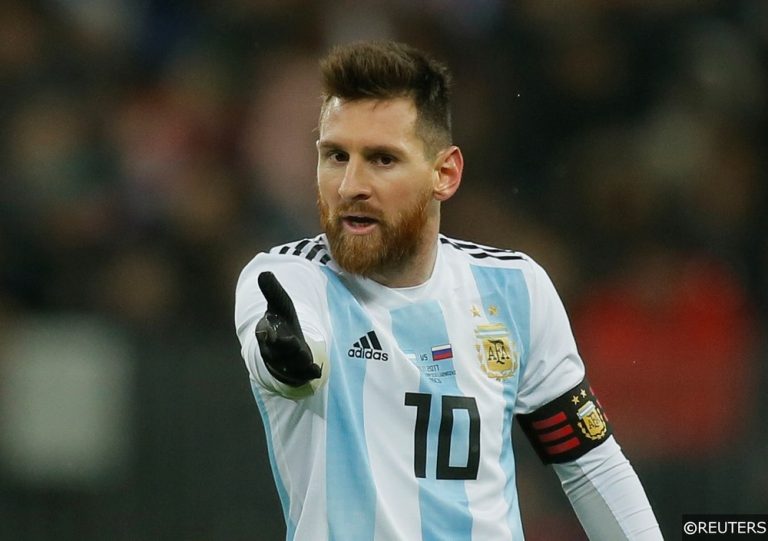World Cup 2018: Looking back at Lionel Messi's international career to date

The heir to Diego Armando Maradona’s throne and one of the greatest players to ever grace the game of football, Argentina’s number 10; Lionel Messi. Argentina’s fate in Russia once again lies in the 30 year old’s left boot and in the following article we trace the Rosarino’s path in La Albiceleste ranks from the very beginning to its current point, looking at some key moments in Messi’s international career.
To see more Argentine related content, as well as much more, be sure to check out our betting blog!
EARLY STAGES:
Messi’s first involvement came with his country came back in June 2004. Having just turned 17, Messi rejected Spanish advances to make his international debut in an 8-0 win over Paraguay at Under 20 level, a match he impressed heavily in.
The 2005 FIFA World Youth Championships at the same age group would see Messi announce himself to the world for one of the first times. He was relatively unknown going into the competition, evidenced by the fact Sergio Aguero had to ask who his team mate even was when he first met him. Nonetheless, Messi would leave the competition as Argentina’s star man, rattling home 6 goals with the help of the likes of Lucas Biglia, Fernando Gago and Aguero himself as Argentina claimed the trophy.
Messi’s senior career hardly got off to such a flying start, however. Called up off the back of his stunning performances with the Under 20s, Messi was handed a senior debut in August 2005 friendly with Hungary, but was sent off just two minutes into it after the referee adjudged him to have intentionally elbowed a Hungarian marker.
Nonetheless, Messi didn’t have long to dwell on said disappointment, called up to the squad once again for a September qualifier with Paraguay and he remained a permanent fixture in the squad in the lead up to the 2006 World Cup in Germany, notching his first senior Argentina goal in a March 2006 friendly with Croatia.
FIRST WORLD CUP:
Still aged only 18, Messi travelled to Germany with far less of a reputation than he holds today and was undoubtedly the wildcard in a supremely talented Argentine side. Free of the pressure he currently finds himself under, Messi would show glimpse of genius but it would prove to be a disappointing tournament for himself and Argentina.
Leo sat on the bench for the first group game against the Ivory Coast but was then awarded a chance to impress in the second group game, coming off the bench to grab a goal and assist in a brief 16 minute cameo during Argentina’s famous 6-0 win over Serbia & Montenegro.
Said appearance had made him Argentina’s youngest ever World Cup player and he was rewarded for such a strong performance with a start in the final group game with Holland, which was a tight affair throughout and ended 0-0.
Going into the round of 16 clash against Mexico, the young Messi was once again consigned to the bench, despite public calls for his inclusion growing louder. Used as an impact sub once more, Messi came on with the scores 1-1 and had a goal ruled out, but it was Maxi Rodriguez who would go on to be the hero in extra time, notching a sweet volley to put La Albiceleste into the quarter-finals.
It was at this stage that Argentina would crash out, in one of the most frustrating games in their recent World Cup history. They dominated the hosts throughout the match and were 1-0 up halfway through the second half before boss Jose Peckerman inexplicably sacrificed play maker Juan Roman Riquelme and replaced him with Esteban Cambiasso, conceding the initiative to Germany who equalised and went on to win on penalties; Messi and millions back home watching on helplessly.
OLYMPIC GOLD:
Having been named young player of the tournament in Argentina’s run to the final of the Copa America in 2007, Messi was becoming closer to the figure we now view him as today and would prove his nation’s talisman in their 2008 Beijing Olympic success.
Barcelona had pressed for Messi not to take part in the Games but he was insistent upon competing. Argentina travelled with a squad packed full of talent, featuring the likes of Garay, Fazio, Zabaleta, Gago, Banega, Maschetrano, Lavezzi, Riquelme, Di Maria and Aguero and with Messi at the forefront, they dominated the event.
Breezing through the group stage with maximum points, Argentine then eliminated Holland and crushed Brazil prior to a final against Nigeria, where Messi would work his trademark magic. He toyed with Nigerian back line time and time again and would eventually provide the assist for Angel Di Maria to claim gold.
Messi was once again an international champion and still to this day ranks his Olympic achievements at the very top of a huge list.
Did any of Messi’s teammates from said success make it into our Greatest Ever Argentine XI ?
2010 WORLD CUP:
In the space of 4 years, Messi had gone from a relative unknown at club and international level into one of the game’s biggest stars. The 2010 World Cup in South Africa was the first time the Argentine team was really dependent on him and having limped through qualification, then manager Diego Maradona looked to develop his entire system around his star man.
Playing as a number 10 in behind Carlos Tevez and Gonzalo Higuain, early signs were certainly promising as Argentina won all three group games, scoring 7 goals in the process. Though Messi himself hadn’t found the net, he was heartbeat of the team, helping to set up all four goals in a 4-1 win over South Korea as well as captaining a heavily rotated side to a 2-0 win against Greece in the final group game.
The round of 16 clash up against Mexico was won in dominant fashion against Mexico, with Messi assisting the first goal in a 3-1 win, but it was all to come crashing down as Maradona’s men were utterly trounced 4-0 by Germany in the quarters, who exposed the team’s defensive frailties and kept Messi quiet, with the Barcelona man ending the tournament with a performance for which he was criticised greatly back home.
2014 WORLD CUP:
By the time the 2014 World Cup swung around, Messi was now unquestionably Argentina’s talisman and now captain, he’d really began to find his feet with La Selección. Alejandro Sabella was the first international manager to ever really get the best out of him and by handing him more of a free role, Sabella had unchained the weight of pressure reigning down, evidenced by the huge amount of goals Messi scored in friendlies as well as 10 goals in 14 qualification matches.
In Brazil, there was a real feeling that it was going to be Argentina’s year and the huge amount of fans that travelled to their close neighbours gave their country tremendous backing in every match. In the early stages of the competition, Messi dazzled and looked at the peak of his powers, rattling home 4 goals, including a sublime last minute strike against Iran.
Though he wouldn’t score in any of the preceding games in the run to the final, Messi was still proving his weight in gold to the Argentine team, assisting an extra time winner against Switzerland in the round of 16 before helping unpick Belgium and scoring his penalty in the semi-final shootout win over Holland.
On the cusp of eternal glory; it just wasn’t to be as Germany once again proved the nemesis. Gonzalo Higuain missed a huge opportunity in normal time of the final and Mario Gotze’s extra time strike broke Argentine hearts and started a run of continual disappointments that would culminate in Messi retiring from international football.
POST 2014 WORLD CUP TO PRESENT DAY:
In 2016, after losing two consecutive Copa America finals, which you can read more about in our Argentina’s Final Curse piece, Messi briefly entered international retirement, stating that he’d done everything he possibly could to secure a title but it was now over. Nonetheless, amidst a public outcry of support and the love of teammates, Messi was convinced to return and every Argentine should be thankful for that, as without him they wouldn’t even be at the forthcoming competition.
More Messi-dependent than ever before, an otherwise uninspiring Argentina are completely reliant on the man current boss Jorge Sampaoli describes as “the best player of all time”. In qualification, Argentina picked up an average of 2.1 points a game in the 10 games Messi played whilst that figure astonishingly dropped to 0.875 a match in the 8 fixtures he was absent from.
Going into the final qualification match against Ecuador in desperate need of a win, Messi stepped up in his nation’s most desperate hour, coming up with all three goals in the crucial 3-1 win. The statistics are there for all to see; without Messi Argentina would not have qualified and without him they certainly wouldn’t be considered as in the running to lift the trophy this year.
With a wealth of experience under his belt and having risen from the depths of anonymity, Argentina needs Messi more than ever before. On the brink of turning 31, Messi now sits in last chance saloon as far as the World Cup is concerned, but will he be returning home empty handed or with the beaming gold trophy in between his hands? Only time knows.
Follow Free Super Tips on Twitter to stay up to date with our daily tips and predictions or browse more football content on our website:


